'The only idea -- the only idea -- of the shutdown was to buy time.'

"Once we realised that this is going to be a couple of months of battle and it is not just a few weeks, then we have to ask ourselves, will we ever be able to have a shutdown for six months, nine months? And the answer is no," Dr Anup R Warrier, consultant for infectious diseases at the Aster Medcity Hospital, Kochi, tells Rediff.com's Vaihayasi Pande Daniel in the concluding segment of a two-part interview.
What are your thoughts on hydroxychloroquine and BCG vaccination?
Both are two (things) with different theory behind them.
So regarding the BCG vaccination, I think it is very, very early and quite unlikely, at all, to protect.
From the scientists's angle -- when we discuss this among our professional societies, the infectious diseases societies and clinical microbiology societies -- we are not very comfortable or confident that this is something is going to be very protective.
Basically here people are rushing into 'research' findings -- probably to find solace from the fact that all of us are in a crisis situation.
It will take another four to six weeks to see where India stands to gain from BCG vaccinations.
And hydroxychloroquine?
When you talk about the hydroxychloroquine, now what we realise is that hydroxychloroquine and many such chemicals, they have had in-vitro, or laboratory-based data, for a long amount of time, for various viral diseases.
Unfortunately, for none of viral diseases could they actually show clinical benefit.
Now, there are large trials, which include thousands of people, in the European countries (going on), which are looking at this particular question -- whether hydroxychloroquine will work.
If you put it simply, hydroxychloroquine has got all the theoretical basis for it to work. It inhibits the binding of the virus to the receptor, it inhibits multiplication of the virus inside the cell.
It also sort of blocks its connection to the heme molecule (in the hemoglobin) in the RBC (red blood cells). There a lot of theoretical basis for hydroxychloroquine.
The same thing has been noticed with other viruses, in the past, but it has not helped with the treatment of those viruses.
Chikunguniya, dengue, even influenza sort of viruses. There are many other viruses where this laboratory phenomenon has been observed, but it didn't work clinically.
We have to watch for this data, for the clinical data to come. WHO is already conducting clinical trials, including thousands of these people.
I'm sure that in a week or two or so, the results of the reports of these studies will come up and then we will have more confidence.
Right now, we are going more by the sort of anecdotal data. Even in Kerala when we had proven cases, actually people with pneumonia, a couple of them got Lopinavir (an antiretroviral, one of a combination of drugs which has been used against HIV infections) and a latter part got hydroxychloroquine.

So Kerala is also still waiting to see how hydroxychloroquine worked and it is too early to say, in the cases where you used -- the evidence is not conclusive because there have been just a few cases and not seriously-ill COVID-19 patients?
Yes.
There are two schools of thought on the use of lockdowns and their extensions. What is your view?
Do you feel the lockdown should continue or there should be a region by region let up depending on the cases?
But that can be only possible if it is established through thorough testing that there is no COVID-19 case is left in those area and that there is absolutely no movement between areas. And that's quite difficult in India.
This is a long-haul sort of a situation.
We will have these cases around the world for the next six to nine months.
So it's not like it is going or that everything is going to subside after one week, all around the world, and then all will be back to normal.
No, it is not a situation like that.
Once we realised that this is going to be a couple of months of battle and it is not just a few weeks, then we have to ask ourselves, will we ever be able to have a shutdown for six months, nine months?
And the answer is no.
We will not.
A lot of people will die from poverty and other complications -- a lot of issues will be there.
It is not possible for any country to have a continuous shutdown for six months and nine months.
You will have to block all incoming traffic, air traffic, inter-state traffic etc until the disease disappears throughout the world!
That is not possible. Not practically possible!
We can't think that the shutdown can continue like this until there is no more COVID-19 out there.
We have to have to have a scene where we are able to come down on the lockdown restrictions. We are able to open up a bit.
But still how do we catch, identify and isolate people, who get the disease when where they are coming in from the other places?
Suppose if I talk from the Kerala perspective, if for the next two to three days, suppose, we are having very few cases and we reach a situation where we have contained it.
Then when we open up our borders. How will Kerala ensure that when people travel -- suppose they are coming in from Bombay, which is now a hot bed and you now have hundreds and thousands of cases coming up in Bombay -- and people coming in from (say) Bombay will not spread this disease in the community in Kerala again?
While I completely realise that an extended shutdown is not a practical thing, because there is no end point like one week, two weeks or one month or two months, it's a very long haul.
We will kill not just the economy, but obviously a lot of people if we go on like that.
We have to have a plan where we need to come up from this shutdown.
But that is only possible when:
1. We have a lot of access to testing.
2. Access to the ability to quarantine and put people in isolation and,
3. aA very effective way of treating the complications for people who get sick and who need hospitalisation.
The only idea -- the only idea -- of the shutdown was to buy time.
Time, so that you generate enough capability of tests, generate enough PPE to generate enough beds, to generate enough capability that you are able to triage, identify and isolate patients. That is the idea.
Use these three weeks or four weeks or whatever number of weeks, to do these things, increase your testing capability, to get inventories of PPE, get ready for hospitalisation and quarantine.
Then when you open up, you need to put these things into use so that anybody who's coming in -- we can test them, quarantine them and take them away, so that our healthcare system can manage whatever complications that come out of it.
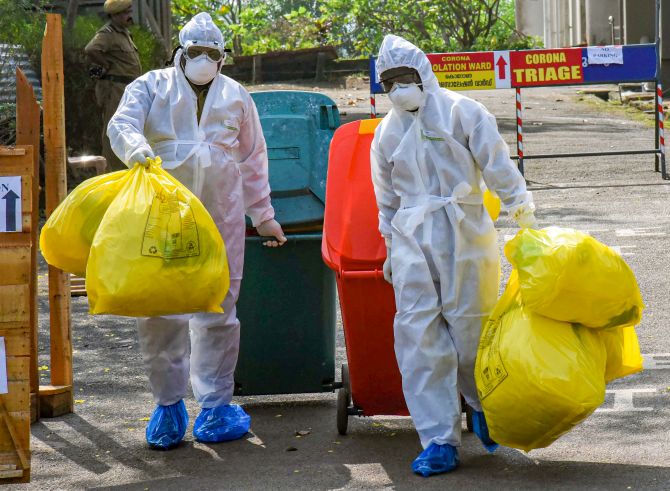
There was a recent interview and video from an ER physician fighting COIVD-19 in New York. He said he was seeing a high number of deaths after patients were put on ventilators because they were put on ventilators, because this not exactly an illness that presents itself like other illnesses.
So he believes there is some tweaking that has to be done before you put a patient on a ventilator.
I have not actually seen the video, but I read a couple of things about the difference in ARDS (acute respiratory distress syndrome) and pneumonia from these COVID patients.
There have been multiple theories and -- for the good or the bad -- we have not come in contact with those kinds of serious stage patients.
Even the mortalities which we have had, they had serious cardiac abnormalities and they did not die primarily from pneumonia.
Mostly they died from cardiac issues. We personally we have no experience with managing ARDS or pneumonia in these patients.
We are familiar with the theory part, but we have not actually come face to face with it so we don't have any personal experience.

Kerala is one of the more tropical of Indian states. Are you yet seeing any, any, any connection of the lack of survival of the SARS-CoV2 virus that causes COVID-19 in relation to temperature and humidity or a potential for seasonal reduction in cases, which implies a resurgence later.
Anything at all that is being seen?
No.
I am not a strong proponent of the climate theory and there are multiple reasons for that.
And most of the professionals societies agree that that will not hold much water -- the humidity, temperature part.
With varying temperatures and different, different situations COVID-19 has been seen. In Kerala last week, we had thunderstorms and still we had 12 to 14 cases diagnosed, each day, in the northern districts.
It's not just me, even our professional societies and most of the people in clinical microbiology, we don't sort of believe that a change in temperature or humidity will have a drastic impact on the transmission.
During this crisis, what kind of hours are you putting in? How busy are you with this crisis?
Right now, all the numbers which we had, except for a couple of UK citizens, they are all managed in the government isolation centres.
In private (hospitals), in my hospital, we have just about four UK citizens, we had to take care of and none of them, as I told you earlier, were drastic or in the ICU.
So as of now we are neither crunched for manpower. Or is it a hectic situation for us.
What are areas of concern in this war to overtake COVID-19?
I wanted to state that though there are a lot of announcements, from various sources, in terms of production and supply and availability of PPE, in reality it is very difficult to come by in the market.
I have been in touch with my procurement team and we have been trying to source (material) -- especially the N-95 masks -- from Indian manufacturers.
Even for the PPE, for which we need some sort of standard requirement/or performance requirements, it is very difficult for us -- or I would say almost impossible for us to find an Indian manufacturer whose product meets the specifications -- WHO specifications -- for the PPE and also especially for the N-95 mask and most things.
I was mentioning earlier about the shutdown period and that we are in a lull period now; even our normal cases have come down tremendously. Now a major time for us to prepare.
We are preparing by providing training to our staff in two things. One, we are cross-training our other medical and surgical specialties to support the intensive care staff in the ICU and the general medicine wards.
Second, we are training them in the appropriate use of the PPE -- that is donning and doffing of PPE, what kind of PPE to use, how to wear it and take it off.
That is how we are spending our time. Basically training. Because right now, as I told you, we don't have any work on COVID. We have just four mild cases -- they are going to be discharged.
So we are preparing in this fashion.
But allthis will work out only when the supply of PPE is assured at the end of it.

There is no place in India which is manufacturing PPE upto standard?
Correct.
When you look at WhatsApp, Facebook, social media, you will find a lot of hospitals, big, big hospitals, All India Institute, St John's Bangalore, and all of them are doing a lot of homemade stuff, cutting up material, they're stitching material to make equipment and masks.
All of us are re-using the N-95 mask, which is supposedly a single-use item.
Why?
Why should you force hospitals and healthcare workers to go for all this?
Why can't you produce and supply enough masks and gowns so you don't have to stitch gowns in the hospitals or reuse the masks?
There is no manufacturer that you know, of India, that's getting close to knowing how to manufacture it properly yet?
Nothing in the market as of yet.
And if you see in social media you will find all large hospital chains doing it. They are doing a lot of this homemade stuff. None of them are validated and we don't know how they will perform.
Can't we manufacture enough numbers?
Why are we forcing people to do this kind of stuff?

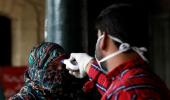






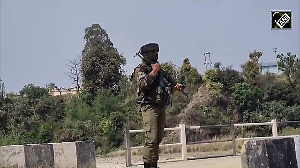
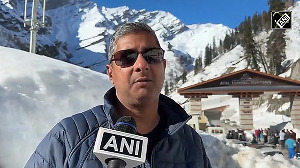
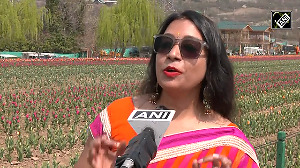
 © 2025
© 2025